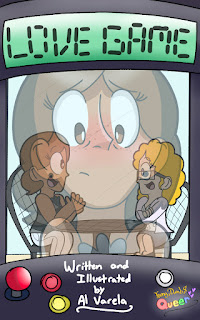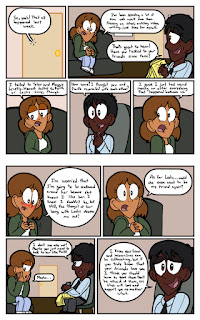Al Varela's work is different from a lot of their classmates, but in many respects is representative of comics at large, especially with regard to webcomics. This mini, Love Game, is part of a larger series called Young, Dumb & Queer (an all-time great title!). The art style is clear manga-influenced, and the character design is clear, consistent, and highly expressive. While it's full color, the color doesn't overwhelm the line art and things like gesture and body language.
From a technical standpoint, I just wished it was bigger. The art felt cramped. The text overwhelmed the art in a lot of panels, in part because in a character study like this, there was a lot of dialogue that needed to be used. I often speak of a rough 2:1 rule in panels and on pages: Two-thirds of your panel should be an image, and no more than one-third should be text. This is a rough rule that can be worked around, but when the text overwhelms the art on multiple pages (especially if it's a talking heads story), it leads to feeling cramped. I also appreciated Varela hand-lettering the whole thing, but their lettering suffered from the same cramped quality. They'd probably benefit from using an Ames guide to letter, in addition to alloting more space to the art.
As for the story, Varela effortlessly weaves multiple relationships in multiple states for a group of young queers who are trying to figure things out. The aspect of the story that I found most interesting was that there were heroes or villains in this story--only people trying to figure things out as best they could, often while trying to combat their own limitations and mental illness. For example, Leslie is a character who hurt Maggie. Maggie was concerned when she spotted Leslie making out with Faith, both because she was worried that Leslie might hurt faith but also that her lovesick friend Pearl would freak out, because she was into Faith. Leslie does and says a lot of insensitive things in this comic, but she's not a villain. Her self-loathing has painted her into a corner where she feels "bad" and hence does "bad" things, but those are ultimately her own choice and ineffective as behavior. The story explores the limits of each of the characters as they ultimately share empathy and work things out, with some funny and awkward steps along the way. Varela has a keen understanding of character dynamics that's enhanced by their skilled use of gesture and an understanding of how bodies interact in space. In other words, their storytelling is quite good; it's just some of the details that need to be cleaned up.






No comments:
Post a Comment